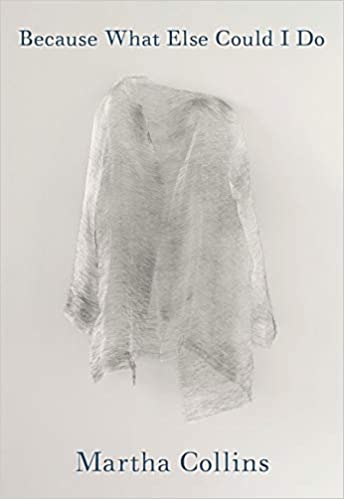
Martha Collins. Because What Else Could I Do. University of Pittsburgh Press, 2019. 55 pgs. $17.00.
Martha Collins’ Because What Else Could I Do is a moving and effective collection written in response to her husband’s death. The poems are filled with grief, of course, which is never a linear experience, and these poems portray the speaker’s confusion, her attempts to make sense of something that can never be understood.
None of the poems are titled, for titles would make them seem finished, would situate them as art, when in some ways they are more like fragments of something that can never be made whole. Stylistically, the poems are disjointed, ungrammatical, and often spare—as thinking is in the midst of grief. Although she did not originally intend to publish this work, Collins’ great success here lies in her ability to convey the grief-stricken mind as well as the grief-stricken heart while also providing enough narrative detail for the reader. Nothing is revealed all at once, and some things aren’t entirely revealed at all, yet the speaker still seems trustworthy, and readers will sense that enough will eventually be made clear.
Here is one placed toward the beginning of the collection, as the speaker tries to reconcile herself with facts by obsessively recalling moments she’d change if only she could:
back I go back and do over it’s
7:30 I drop the papers and put
my arms around you and tell you—
back I go back it’s the week before
I put my arms around you and say
I will never let you go if those
people come to take you away I
will not let you go I say I—
The speaker’s husband had been receiving scam calls from individuals claiming to represent the IRS—“those people” in the third stanza—and threatening him with arrest; these calls literally drove him to his death.
Here, the speaker’s thinking is obsessive, “back I go back and do over,” and so are her actions. When we reach the final stanza, we realize that she is not only assuring her husband that she will “never let you go,” but she is insisting on their continued connection to herself, insisting almost that he cannot actually be gone, and to her readers. Like the other poems in the collection, this one uses very little punctuation, relying only on two dashes, one of which occurs at the end of the final line. So the final line isn’t final, but it doesn’t simply drift off, as it would if Collins had used ellipses, or even if she had ended without any punctuation, as most of the poems do; instead, the line and thought are interrupted. The last line consists of eight monosyllabic words, establishing an insistent yet irregular rhythm. This poem creates its emotional effect primarily through its repetition, but there’s more to craft than simply the evocation of emotion. Collins’ smartest craft choice is that final dash.
Here is another of the poems, later in the collection, in which the speaker’s grief is less raw:
the winding road
the bare trees
through bare trees
the gray pond
beside the pond
the bench where you sat
the empty bench
the still pond
across the pond
the two white chairs
the chairs reflected
where I would swim
and when I’d swum
almost back in
you’d get in the water
and meet me there
This poem is in some ways more conventional, with its reliance on concrete imagery and on the revelation in the final couplet. Yet here, too, the speaker repeats herself, the word “pond” used in each of the first four couplets, along with “the bench,” “the empty bench,” and “the two white chairs,” “the chairs”—the turn in the poem occurring between those two instances of “chairs.” So many of the external markers remain the same, though everything for the speaker has changed. She is less adrift in this poem, though, as the final couplet suggests that her husband will still meet her as she arrives on shore. He is gone from this world, and yet, the poem suggests, his presence is more than simply memory.
The couplets and the short lines suit this poem well, not only because they establish a sense, accurately or not, of order, but also because they emphasize the significance of the concrete objects the poem describes. Grief peels away everything that is extraneous. There are other human states that benefit from an accumulation of language, but grief is spare. It is eventually, as Emily Dickinson so famously stated, “a formal feeling.” Here, it is restrained. The poem is also almost reassuring; it concludes not with the speaker swimming away, toward the opposite shore, nor with her returning to an empty shore, but to the place where her husband met her so many times. Even the grammatical mood here, the conditional “would,” suggests reassurance, in contrast to the finality of a simple past tense.
I can’t exactly say I enjoyed this collection, for it is so sad, and it describes a situation that went so wrong, but I am grateful to have read it. It tells the truth, which is, perhaps, poetry’s greatest responsibility.
